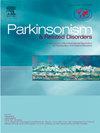帕金森病中的孤独感:主观体验掩盖了客观的运动损伤
IF 3.4
3区 医学
Q2 CLINICAL NEUROLOGY
引用次数: 0
摘要
孤独感与生活质量差和健康状况有关,但其与帕金森病(PD)的相关性尚不完全清楚。目前的研究旨在了解PD患者的孤独率及其决定因素。方法对178例PD患者(60%为男性)进行连续横断面抽样,这些患者的疾病分期(86%为早期)均为金标准诊断。孤独感以两个量表为特征,PD以客观测量、运动评分和感知功能影响为特征,社会情绪评估包括社会联系、抑郁和生活空间。非参数双变量和稳健性多变量回归确定了PD患者孤独感的预测因子,以及PD功能影响的社会情绪预测因子。结果大多数参与者都有担忧,64.6%的人认为自己很孤独。PD阶段,而不是运动障碍或其他客观指标,预测孤独。PD功能影响、社会网络规模、社会支持、抑郁和生活空间的主观测量与孤独感有显著关系。在多变量模型中,抑郁、PD功能影响和社会网络规模特别成为孤独的最重要预测因素。虽然社交孤独通常更受PD的影响,但男性的情感孤独更多。同样,孤独是PD功能影响的一个有效的、独立的预测因子。结论孤独感是PD患者的一个关键问题,它与个体对疾病的反应有关,而不是客观的运动严重程度。尽管帕金森病对一般关系的质量影响最大,但男性可能会额外失去亲密的知己。针对抑郁和社会网络的干预不仅可以改善孤独感,还可以改善PD的功能影响。本文章由计算机程序翻译,如有差异,请以英文原文为准。
Loneliness in Parkinson's disease: Subjective experience overshadows objective motor impairment
Introduction
Loneliness is linked to poor life quality and health, but its relevance in Parkinson's disease (PD) is incompletely understood. The current study aimed to understand rates of loneliness and its determinants in PD.
Methods
Consecutive cross-sectional sampling resulted in 178 PD subjects (60 % men) across disease stages (86 % early-stage) with gold-standard diagnoses. Loneliness was characterized with two scales, PD was characterized by objective measures, motor ratings, and perceived functional impact, and social-emotional assessment included social connection, depression, and life space. Nonparametric bivariate and robust multivariate regression determined predictors of loneliness in PD, and social-emotional predictors of PD functional impact.
Results
Most participants had concern, with 64.6 % endorsing high levels of loneliness. PD stage, but not motor impairment or other objective measures, predicted loneliness. In contrast, subjective measures of PD functional impact, social network size, social support, depression, and life space had a significant relationship with loneliness. In multivariate models, depression, PD functional impact, and social network size specifically emerged as the most important predictors of loneliness. Although social loneliness was generally more impacted by PD, men had more emotional loneliness. Similarly, loneliness was a potent, independent predictor of PD functional impact.
Conclusions
We show that loneliness is a critical issue in PD which relates more to individual response to disease than objective motor severity. Although PD most impacts general relationships’ quality, men may have additional loss of intimate confidantes. Interventions targeting depression and social networks may not only improve loneliness but also improve PD functional impact.
求助全文
通过发布文献求助,成功后即可免费获取论文全文。
去求助
来源期刊

Parkinsonism & related disorders
医学-临床神经学
CiteScore
6.20
自引率
4.90%
发文量
292
审稿时长
39 days
期刊介绍:
Parkinsonism & Related Disorders publishes the results of basic and clinical research contributing to the understanding, diagnosis and treatment of all neurodegenerative syndromes in which Parkinsonism, Essential Tremor or related movement disorders may be a feature. Regular features will include: Review Articles, Point of View articles, Full-length Articles, Short Communications, Case Reports and Letter to the Editor.
 求助内容:
求助内容: 应助结果提醒方式:
应助结果提醒方式:


